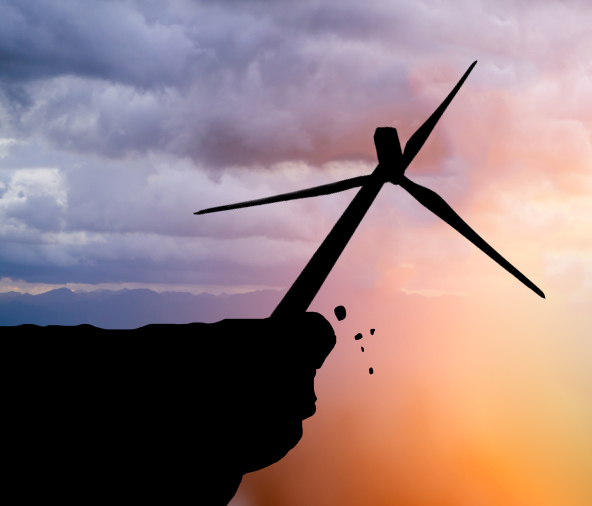Yesterday afternoon, Politico hosted its “Energy and the Presidency” event, presenting an even-handed look at energy politics as relayed primarily by people who are beholden to fossil fuel interests. (We made fun of this event last month.)
During the event, an activist for Greenpeace challenged Jeff Holmstead, a former Bush EPA official and now coal industry lobbyist, over his pretending to be considering the issue objectively.
The activist raises a good point and no one blinks and the activist is escorted out and the conversation continues. Same as it ever was.
Meanwhile, sitting quietly somewhere in that room, in the shadows, watching as the young man spoke up, was a person paid to do exactly that sort of advocacy on behalf of the wind industry. As the young man grabbed his coat, yelling out his points, there was a representative of the wind industry listening, maybe looking down at his or her plate guiltily. How do I know this person was there? Because the wind industry sponsored the goddamn event.
You may remember that the wind industry is in a fight for its life, struggling to get approval on Capitol Hill for an extension of the wind production tax credit (PTC), a key tool for leveling the playing field for wind energy which expires at the end of next month. If it fails, the American Wind Energy Association projects that the industry could shed 37,000 jobs. And how does AWEA plan to get it passed? Apparently by giving money to Politico for events at which coal lobbyists bash subsidies for wind power while sitting in front of a backdrop that reads “American Wind Power.”
Our colleagues at Climate Desk have a great report today articulating the odd, unbalanced political position that AWEA and the broader wind industry are trying to occupy.
This week [Infinity Wind Power’s Matt] Riley and his wind industry peers, from turbine manufacturers to developers to electricians to siting consultants, gathered at a swanky resort in the desert outside Phoenix to regroup after the election and look ahead at the next four years. But although Riley’s pre-election [sense that Romney made him nervous] was widely shared by people here, the mood feels less like jubilance and more like the tepid relief of a bullet dodged.
“I’d be a lot more pessimistic if Romney was elected,” said a wind expert for General Electric. “But sadly, not enough has changed.”
Pat Bousliman, a former staffer for Senator Max Baucus (D-Montana) and one of a cadre of Washington insiders who addressed the assembly, agreed: “It could have been a whole lot worse for the wind industry, but [the election] didn’t change much.” …
The folks behind Big Wind’s lobbying efforts in Washington remain upbeat: Denise Bode, head of the American Wind Energy Association, gleefully announced that of Congressional candidates backed by the trade group, 86 percent won in the Senate and 88 percent in the House, which she called a “very positive result for the wind industry.”
But even if AWEA had hand-chosen 435 members of the House, each of whom won election, the organization still wouldn’t be able to preserve the tax credit this year because new reps won’t be sworn in until January, after the PTC is due to expire.
What happens next with the PTC is uncertain. Sen. Lisa Murkowski (R-Alaska) proposed a five-year phaseout; other senators have proposed shorter timelines. Sen. Chuck Grassley (R-Twitter) suggests that its fate is tied to “fiscal cliff” negotiations.
The fight for the PTC will be won by making the case to individual sitting elected officials that it’s worth preserving. One of the congressmembers at the Politico event was Steve King (R-Iowa), a staunch Republican who nonetheless supports extending the PTC because of the number of wind jobs in his state. What’s needed are things like this letter:
Sent on behalf of a bipartisan group of governors from 23 states, this letter is from the Governors’ Wind Energy Coalition, an organization independent from AWEA. Letters don’t do much, particularly this late in the game, but for a national issue held hostage to a political interest group, the coalition at least offers a national demonstration of need.
AWEA, meanwhile, is exhibiting signs of energy-industry Stockholm syndrome. Bode, the group’s CEO, yesterday advocated the fossil-fuel-appeasing “all of the above” mantra in an opinion piece — at Politico, of course, to tie in to the event. “Voters in last week’s elections endorsed candidates who support an ‘all-of-the-above’ energy policy that promotes a diversified portfolio of energy resources, specifically wind energy and the extension of its primary federal incentive, the Production Tax Credit (PTC),” she writes. She walks through all of the candidates who won election and reelection and had some tangential relationship to the wind industry, as though voters went to the polls thinking first and foremost of wind energy. This was Bode’s moment to persuade, a moment AWEA bought with its event sponsorship, and she undoubtedly persuaded no one.
Wind energy faces a passionate and well-funded opposition. It has a broad base of largely dispassionate support among Americans. And it has paid advocates who seem unclear on how to make progress in an existential fight over the sector’s future — advocates who met at a “swanky resort” this week to shrug at each other, and who paid money to host an event where a coal lobbyist bashed them.
Only one bright spot came out of yesterday’s “Energy and the Presidency” event: An activist raised his voice. And the lobbyists on whose behalf he was speaking up no doubt found it embarrassing.

This image, over and over, forever.



